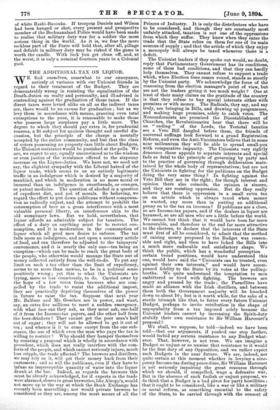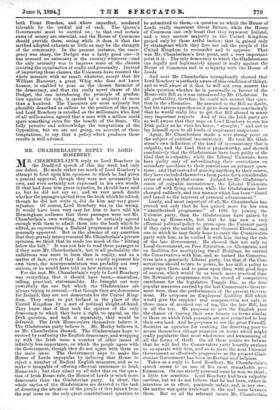THE ADDITIONAL TAX ON LIQUOR.
WE find ourselves, somewhat to our annoyance, entirely at variance with our Unionist friends in regard to their treatment of the Budget. They are demonstrably wrong in resisting the equalisation of the Death-duties on realty and personalty, and ill-advised in contending against the graduation of those taxes. If the direct taxes were levied alike on all as the indirect taxes are, there would be no excuse for graduation ; but as we levy them in accordance with means, granting even total exemptions to the poor, it is reasonable to make those who possess large surpluses pay a little more. The degree to which they should pay extra is, for prudential reasons, a fit subject for anxious thought and careful dis- cussion, but the principle of the charge is mentally accepted by the entire community, and but that the class of voters possessing no property care little about Budgets, the Unionist resistance would be punished at the polls. We are, we regret to say, equally unconvinced as to the wisdom or even justice of the resistance offered to the sixpenny increase on the Liquor-duties. We have not, we need not say, the slightest sympathy with the Liberal hatred of the liquor trade, which seems to us an entirely legitimate traffic in an indulgence which is desired by a majority of mankind, and which in moderation is no more moral or immoral than an indulgence in sweetbreads, or oranges, or patent medicine. The question of alcohol is a question of expedient diet, and not of morals. So believing, we regard the effort to put down publicans without compensa- tion as radically unjust, and the attempt to prohibit the consumption of beer as a gross interference with a most valuable personal liberty, an interference akin to the old sumptuary laws. But we hold, nevertheless, that liquor affords an admirable subject for taxation. The effect of a duty on anything must be to restrict con- sumption, and it is moderation in the consumption of liquor which all good men desire to enforce. The tax falls upon an indulgence, and not upon a necessary article of food, and can therefore be adjusted to the taxpayers' convenience, and it is nearly the only one—tea being an exception—which can be made to reach the great body of the people, who otherwise would manage the State out of money collected entirely from the well-to-do. To put any limit on such a tax other than the limit of expediency, seems to us more than unwise, to be in a political sense positively wrong ; yet this is what the Unionists are trying, more or less consciously, to do. Carried away by the hope of a few votes from brewers who are com- pelled by the trade to resist the additional impost, they are practically depriving themselves of the power in future to raise the tax. Suppose that next year Mr. Balfour and Mr. Goschen are in power, and want, say, an extra five millions to meet a sudden emergency, with what face can they ask, as they must ask, one-half of it from the Income-tax payers, and the other half from the beer-drinkers ? They cannot get the poor man's half out of sugar ; they will not be allowed to get it out of tea ; and whence is it to come except from the one sub- stance, the use of which even the man who pays the tax is willing to restrict ? Why should they hamper themselves by resisting a proposal which is wholly in accordance with precedent, which does not really interfere with the com- forts of the people, and which cannot seriously injure, much less cripple, the trade affected ? The brewers and distillers, we may rely on it, will get their money back from their customers ; and so will the publicans, even if they have to infuse an imperceptible quantity of water into the liquor drunk at the bar. Indeed, as regards the brewers this must be already acknowledged, for if experts in the trade were alarmed, shares in great breweries, like Alsopp's, would not move up in the way at which the Stock Exchange has recently been marvelling; nor would private brewers be considered as they are, among the most secure of all the Princes of Industry. It is only the distributors who have to be considered, and though they are constantly most unfairly attacked, taxation is not one of the oppressions from which they suffer. They know when they enter the trade that the State relies on them for one of its main sources of supply ; and that the article of which they enjoy a monopoly will always be taxed whenever there is a deficit.
The Unionist leaders if they spoke out would, no doubt, reply that Parliamentary Government has its conditions, some of them bad conditions, and that they can hardly help themselves. They cannot refuse to support a trade which, when Election time comes round, stands so stoutly by the Unionist party. We acknowledge the force of the reasoning from the election manager's point of view, but are not the leaders giving it too much weight ? One at least of their many claims on the gratitude of the country is that they refuse to buy special interests either with promises or with money. The Radicals, they say, and say truly, are bringing in Bills, and drawing up programmes, and making huge promises, solely to catch votes. The Nonconformists are promised the Disestablishment of Churches, the Revolutionaries hear that there will be an " ending " of the Lords, the Teetotal fanatics see a Veto Bill dangled before them, the friends of universal suffrage look forward to a grand Registration Reform, and even the Anti-Vaccinators believe that in some near millennium they will be able to spread small-pox with comparative impunity. The Unionists very rightly denounce these appeals to separate interests and special fads as fatal to the principle of governing by party and. to the practice of governing through deliberation main- tained by the whole body of representatives; but are not the Unionists in fighting for the publicans on the Budget doing the very same thing ? In fighting against the Veto Bill they are in the right ; for though interest and opinion there also coincide, the opinion is sincere, and they are resisting oppression. But do they really believe that there is oppression in a small extra tax on an article which is always taxed when money is wanted, any more than in putting an additional penny on to the tax on incomes ? If publicans are a class, so are Income-tax payers, and if the dealers in liquor are harassed, so are all men who are a little before the world. We cannot but think that it would have been far more honourable, and therefore in the end far more attractive to the electors, to declare that the interests of the State must first of all be considered, to admit that the method of raising money proposed in the Budget was reason- able and right, and then to have licked the Bills into a much more endurable and satisfactory shape. We think the public, which has a wonderful perception certain broad positions, would have understood this one, would have said the "Unionists can be trusted, even against their own interests," and would have recom- pensed fidelity to the State by its votes at the polling- booths. We quite understand the temptation to men embittered or tired with fighting. The brewers are angry and pressed by the trade ; the Parnellites have made an alliance with the Irish distillers, and between them both the Government majority will be knocked down to about 10; but is it worth while, for the sake of a sterile triumph like that, to fetter every future Unionist Budget, perhaps to invite retribution in the shape of unpopularity from a tax imposed solely because the Unionist leaders cannot by increasing the Spirit-duty stultify their own resistance to Sir William Harcourt's proposal?
We shall, we suppose, be told—indeed we have been told—that our arguments, if pushed one step farther, would forbid any serious resistance to any Budget what- ever. That, however, is not true. We can imagine a Budget so unjust or so unwise that resistance to it would be the first duty of any Opposition, and we rather expect such Budgets in the near future. We are, indeed, not quite certain at this moment whether in levying a nine- penny Income-tax during peace-time, Sir William Harcourt is not seriously impairing the great resource through which we should, if compelled, wage a defensive war. But in the absence of such foolish or unjust proposal,. we do think that a Budget is a bad pivot for party hostilities ; that it ought to be considered, like a war or like a mihtary or naval reform, as something essential to the safety of the State, to be carried through with the consent of both Front Benches, and where imperfect, rendered tolerable by the cordial aid of each. The Queen's Government must be carried on ; to that end certain sums-of money are essential, and the House of Commons should provide them, seeing while it does it that the method adopted exhausts as little as may be the strength of the community. In the present instance, the emer- gency was sharp, the Budget was a fairly good one—it has aroused no animosity in the country whatever—and the only necessity was to improve some of the clauses insuring the equalisation of realty and personalty. Instead of improving those clauses, the Unionists have resisted the whole measure with no result whatever, except that Sir William Harcourt, a great Whig who does not know finance, is enabled to pose as the chosen financier of the democracy, and that the really novel clause of the Budget, the one introducing the principle of gradua- tion against the rich, is carried by a majority of more than a hundred. The Unionists are most unjustly but plausibly described as callous to the position of the poor, and Lord Rosebery is extolled as the millionaire who, first of all millionaires, agreed that a man with a million could spare something extra for the benefit of the State. We fully perceive and acknowledge the temptations of the Opposition, but we are not going, on account of those temptations, te say that a policy which produces these results is well advised.







































 Previous page
Previous page